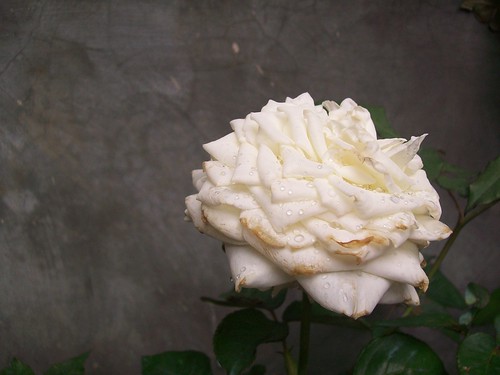There was a time, during my undergraduate, when I stumbled upon Heisenberg’s Uncertainty Principle. The name aside, I found it amusing how this principle on quantum particles also holds true for people if maybe in a weaker form: you can never really observe someone in their natural state as you, the observer, will always affect the observed. This lead me to a fascination with pedestrian Physics, something to go with my all-time fascination with stars and outer space.
So, imagine my excitement when I found out about Nolan’s new film, Interstellar. Screaming Physics sci-fi from its title to every bit of its promotional material and with Christopher Nolan’s name [1] for an endorsement, this is definitely one film I am not going to miss.
Interstellar starts in an agricultural town beset by constant dust storms. Ex-pilot, ex-engineer Cooper works the fields harvesting corn. We are also introduced to his daughter Murphy and her “ghost”, a poltergeist, who displaces books from her bookshelf. With her penchant for science and Cooper’s background, she decides to scientifically prove the existence of her ghost.
During a particularly violent dust storm where Murphy forgot to close her room’s window, Cooper and Murphy witness a bizarre manifestation of Murphy’s ghost: the dust, instead of uniformly covering the floor, settles in patterns of thick and thin lines. Cooper soon decodes the message which leads them to an underground camp, the “world’s best-kept secret”, or rather, what remains of NASA in a devastated world more in need of farmers than scientists. And so begins their adventure.
With the whole film nearing three hours in length, I find the opening of Interstellar to be rather uneventful and winding. Nolan’s way of laying down the setting of this story is subtle and, I think, unconventional but there are acts—like the one where they chase down a rogue drone—which I find to be unnecessary. The film’s story will not be affected by its absence nor is it particularly remarkable as a visual experience. If you go into Interstellar feeling like you’d need a toilet break sooner or later, do it at this scene. Your cue is the line that goes something like “It’s a parent-teacher conference, not grandparent”.
But when the film starts to find to its tempo stars, indeed, fly (puns intended). I’ve done my share of science and although I am no astronaut/physicist, I appreciate the film’s attempts at scientific realism. I am sure that the realism isn’t 100% (those space-assistant robots, for one, have AIs several decades—if not centuries—ahead of what we have) but at least this is a world where science advances in incremental steps, not huge leaps [2], where interstellar journey is a high-risk venture, not a video game.
Good science fiction isn’t really about science but about humanity and Interstellar delivers well on that though you may have to wait a bit, even after the winding intro. There is the expected drama of the characters dealing with the spatial, temporal, and emotional distance brought on them by this space venture but the film has lots more to offer than that. Soon the characters are waxing poetic on love, gravity, higher beings, and human destiny. Those were pleasant moments for me, akin to my undergraduate Heisenberg-principle moment.
And just when I’ve given up on the film having a happy and conclusive ending (it could hang the way Inception did), the engines of Nolan’s story goes into full throttle and throws its audience in gravitational slingshots. In contrast to its slow opening, the defining conflict rose fast and well to slide gracefully into the film’s denouement.
If you ever want to silence my logical/scientific-critical voice, one of the best ways to do it would be through a romanticized sci-fi tale. Biased as it may sound, I was expecting something beautiful along those lines from Nolan. However, true to his genius, Nolan tackles the inconveniences of real-life science and still manages to find a relatable human angle to it. As I said, Interstellar might not be 100% realistic [3] but it is definitely not romanticized or sugar-coated and it is beautiful because of that.
I have not managed to find a way to squeeze this in the main review but I feel that Hans Zimmer, the film’s music composer, also deserves mention. Stay mindful during the film and listen to the music and see your emotions rise and fall along with it. Zimmer’s melodies is a good complement to Nolan’s plot.


